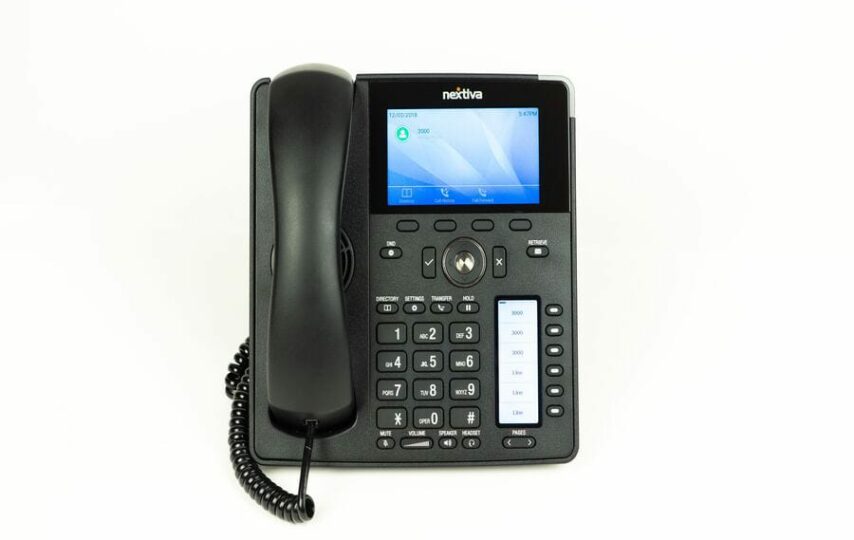Are you tired of paying exorbitant fees for your traditional phone system? It’s time to switch to VoIP! Not only can it save you money, but it can also boost productivity. With VoIP, your business can enjoy advanced features and flexibility while still cutting costs. In this blog post, we will discuss the five ways a VoIP system can save you money and improve efficiency. So sit back, relax, and discover how VoIP technology can benefit your business today!
VoIP systems 101
VoIP stands for Voice over Internet Protocol. It is a technology that allows users to make phone calls using the internet instead of traditional phone lines. With VoIP, voice signals are converted into digital packets and transmitted over the internet to reach their destination.
One of the key benefits of VoIP systems is their cost-effectiveness compared to traditional phone systems. Since it uses existing internet infrastructure, there’s no need for expensive hardware or installation costs associated with landlines.
Another advantage of VoIP is its flexibility. Users can easily add or remove lines as needed without having to wait for new hardware installations or upgrades.
Additionally, many VoIP providers offer advanced features such as voicemail-to-email transcription, call recording, and virtual faxing at no extra cost.
Understanding the basics of a VoIP system can help businesses assess whether it’s worth making the switch from their current telephone provider.
Why VoIP?
VoIP, or Voice over Internet Protocol, is a VoIP phone system that allows users to make calls through the Internet rather than traditional phone lines. So why should you consider switching to VoIP?
Firstly, VoIP offers significant cost savings compared to traditional phone systems. With VoIP, the only equipment needed are phones and an internet connection – there’s no need for expensive hardware or maintenance fees. Plus, long-distance calls can be made at a much lower cost with VoIP.
In addition to saving money, VoIP also provides greater flexibility and mobility for businesses and their employees. Calls can be easily forwarded to mobile devices or laptops, allowing team members to stay connected on the go. This is especially useful for remote workers who may not always have access to a physical office.
Another advantage of VoIP is its advanced features such as call routing and voicemail-to-email transcription. These tools help streamline communication processes which in turn boost productivity levels across the board.
Making the switch to VoIP offers many benefits that can improve your business operations while simultaneously reducing costs.
How VoIP Can Save You Money
One of the most significant benefits of using a VoIP system is its ability to save you money. Unlike traditional phone systems, which require expensive hardware and long-term contracts with providers, VoIP operates over your existing internet connection.
By switching to VoIP, businesses can eliminate many of the upfront costs associated with setting up a new phone system. Instead of purchasing costly equipment like PBX boxes or servers, all that’s required for a basic setup is an IP phone or softphone application downloaded onto your computer.
VoIP also saves businesses money on long-distance calls since they are transmitted through the internet at no additional cost. This can be especially beneficial for companies with employees working remotely or those who need to make frequent international calls.
Another way VoIP saves money is by offering features such as call routing and auto-attendants that increase efficiency and reduce the need for additional staff members. Plus, since calls are made over the internet instead of traditional landlines, monthly bills tend to be significantly lower.
Making the switch to a VoIP system can result in substantial savings for businesses while still providing reliable communication services.
How VoIP Can Boost Productivity
VoIP systems have proven to be a game-changer when it comes to workplace productivity. Here are some ways in which VoIP can boost productivity for your business.
Firstly, with features such as call routing and call forwarding, employees can easily connect with each other without wasting time trying to locate them. This ensures that communication is more efficient and streamlined.
Secondly, VoIP allows for easy video conferencing which means that remote teams can communicate face-to-face just like in-person meetings. This feature saves time and travel costs while still maintaining the efficiency of an office environment.
Thirdly, VoIP provides access to voicemail transcription and email notifications so messages can be read or listened to at any convenient time. This eliminates the need for constant checking of voicemails throughout the day thus allowing employees more uninterrupted work time.
Fourthly, integrating VoIP with CRM software makes it possible for calls to automatically update customer records and provide real-time information on their status, which increases customer satisfaction levels while freeing up valuable employee time previously spent on manual updates.
By using analytics tools provided by most advanced hosted PBX providers companies can monitor call volumes during peak periods ensuring adequate staffing levels leading towards increased responsiveness and better overall service standards thereby boosting team morale as well as productivity.
Upgrading your business phone system from traditional telephony services to a modern cloud-based one has become essential if you want to compete effectively today. With its many features designed specifically for businesses’ needs including cost-saving measures along with enhanced communication options aimed at increasing team productivity make switching over worth considering seriously!
The Different Types of VoIP Systems
When it comes to VoIP systems, there are two main types: hosted and on-premise. Hosted VoIP is a cloud-based solution that allows you to make calls using the internet without needing any hardware or software on-site. This type of system can be very cost effective for businesses with limited budgets since all maintenance and upgrades are handled by the provider.
On-premise VoIP, on the other hand, requires you to have your own equipment installed in-house. This includes servers, switches, routers, and IP phones. While this option can require significant upfront costs for hardware and installation fees, it offers greater control over your system’s configuration and security.
Another type of VoIP system is mobile VoIP which allows users to make calls through their smartphones or tablets via a dedicated app. This type of service is ideal for remote workers who need access to business communications while on the go.
There are hybrid solutions that combine elements of both hosted and on-premise systems. These options offer flexibility in terms of deployment models making them suitable for companies with varying needs.
In summary, understanding the different types of VoIP systems available will help you choose the best one that meets your business communication requirements while keeping costs under control.
Getting Started with VoIP
Getting started with VoIP can seem overwhelming, especially if you’re not tech-savvy. However, the process is actually quite simple.
Firstly, you need to choose a reliable and reputable VoIP provider. Do your research and read reviews to ensure that the provider offers high-quality service and has good customer support.
Once you’ve chosen a provider, decide on which type of VoIP system will work best for your business needs. There are three main types: hosted VoIP systems, on-premises VoIP systems and hybrid solutions.
Next, assess your current hardware and internet connection to determine whether or not they can handle the demands of a VoIP system. You may need to upgrade your internet speed or invest in new hardware such as IP phones or headsets.
After assessing your readiness for implementing a VoIP system into your company’s processes it’s crucial that you train yourself along with employees in utilizing all features available from this technology since it requires more than just making calls; there are advanced communication tools like videoconferencing that require learning too!
Getting started with VoIP may seem daunting at first but taking these steps will make sure everything runs smoothly once implemented!
Conclusion
VoIP systems are a cost-effective and productivity-boosting solution for businesses of all sizes. By switching to VoIP, you can save money on your monthly phone bills while enjoying a range of features that traditional phone systems cannot match. With the different types of VoIP available today, there is an option that will suit your business needs perfectly.
Whether you’re looking for advanced call routing or integration with other communication channels like video conference calls and instant messaging, VoIP has got you covered. So why not make the switch today? Your business will thank you for it!








